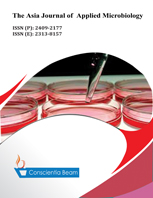Microbiological investigation of bacteria in raw eggs obtained from Obafemi Awolowo University, Nigeria
DOI:
https://doi.org/10.18488/33.v10i1.3411Abstract
This study aimed to investigate the bacterial load and antibiotic susceptibility of bacteria isolated from uncooked eggs, with the goal of assessing potential health risks associated with their consumption. Six uncooked egg samples were collected, including samples from the eggshell, egg yolk, egg albumen, and their mixture. Bacterial enumeration was performed using the serial dilution and pour plate method on nutrient agar and MacConkey agar. Bacterial isolates were identified based on morphological and biochemical characteristics using Bergey's Manual of Determinative Bacteriology. Antibiotic susceptibility testing was conducted using the disc diffusion method on Mueller Hinton agar. The mean total bacterial load in the egg samples ranged from 3.6 x 10^4 to 5.0 x 104 CFU/ml, with coliforms ranging from 2.5 x 103 to 3.0 x 104 colony-forming unit per ml. A total of 48 isolates were obtained and identified, consisting of 13 Gram-negative and 35 Gram-positive bacteria. The identified bacteria exhibited varied susceptibility and resistance patterns to antibiotics. Gram-negative bacteria showed 100% susceptibility to gentamycin, ofloxacin, pefloxacin, and ciprofloxacin, except for Neisseria denitrificans, while demonstrating 100% resistance to nitrofurantoin, augmentin, and ceftriaxone. Most Gram-positive bacteria were susceptible to Pefloxacin and Streptomycin. Some isolates displayed resistance to multiple antibiotic classes, with Micrococcus varians and Bacillus laterosporus showing resistance to 6 and 7 different classes of antibiotics, respectively. The study findings emphasize the potential health risks associated with consuming uncooked eggs due to the presence of multiple antibiotic-resistant bacteria. These findings highlight the importance of proper cooking and handling practices for eggs to minimize the risk of foodborne infections caused by antibiotic-resistant bacteria. It underscores the need for awareness and implementation of appropriate food safety measures to safeguard public health.

